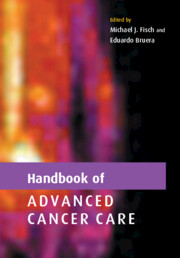Book contents
- Frontmatter
- Contents
- List of contributors
- Preface
- Acknowledgements
- PART I General concepts in oncology
- Part II Primary tumors
- Part III Management of specific symptoms and syndromes
- 41 Assessment of pain
- 42 Drugs for managing cancer pain
- 43 Difficult pain management problems
- 44 Dyspnea
- 45 Loss of appetite and weight
- 46 Fatigue
- 47 Depression and anxiety
- 48 Delirium
- 49 Constipation
- 50 Palliation of fever and sweats: the heat is on!
- 51 Bleeding in advanced cancer patients
- 52 Thrombosis
- 53 Hypercalcemia of malignancy
- 54 Lymphedema
- 55 Wound care of the advanced cancer patient
- 56 Infections in patients with advanced cancer
- 57 Urogenital complications
- 58 Brain metastases
- 59 Bowel obstruction
- 60 Bone metastases
- 61 Meningeal cancer
- 62 Pleural and pericardial effusions
- 63 Superior vena cava syndrome
- 64 Chronic nausea
- Index
- References
48 - Delirium
Published online by Cambridge University Press: 04 August 2010
- Frontmatter
- Contents
- List of contributors
- Preface
- Acknowledgements
- PART I General concepts in oncology
- Part II Primary tumors
- Part III Management of specific symptoms and syndromes
- 41 Assessment of pain
- 42 Drugs for managing cancer pain
- 43 Difficult pain management problems
- 44 Dyspnea
- 45 Loss of appetite and weight
- 46 Fatigue
- 47 Depression and anxiety
- 48 Delirium
- 49 Constipation
- 50 Palliation of fever and sweats: the heat is on!
- 51 Bleeding in advanced cancer patients
- 52 Thrombosis
- 53 Hypercalcemia of malignancy
- 54 Lymphedema
- 55 Wound care of the advanced cancer patient
- 56 Infections in patients with advanced cancer
- 57 Urogenital complications
- 58 Brain metastases
- 59 Bowel obstruction
- 60 Bone metastases
- 61 Meningeal cancer
- 62 Pleural and pericardial effusions
- 63 Superior vena cava syndrome
- 64 Chronic nausea
- Index
- References
Summary
Introduction
Delirium is a common and frequently distressing neuropsychiatric complication in cancer patients. It has been defined as a transient global disorder of cognition and attention. These features are highlighted in the Diagnostic and Statistical Manual of Mental Disorders (4th edition; DSM–IV) core diagnostic criteria for delirium (Table 48.1), which also includes perceptual disturbance, acuity of onset (hours to days), fluctuation in clinical features, and the presence of an underlying cause, such as a general medical condition, substance induced, multiple etiologies, or unknown etiology. Delirium is associated with increased morbidity and mortality, prolonged hospital stay, and especially in the elderly, an increased requirement for institutional care.
Epidemiological aspects
Delirium occurrence rates in the range of 8–88% have been reported in hospitalized cancer patients. This wide range likely represents differences in diagnostic criteria, and populations selected on the basis of admission to different settings (for example, early versus advanced disease) or referral to different consult services such as psychiatry or neurology. Prospective studies have reported delirium in 40% of advanced cancer patients on hospital admission and in almost 90% of these patients in the last hours or days prior to death. Despite its remarkable frequency as a terminal event, delirium reversal has been reported in approximately 50% of episodes.
Clinical features
Delirium is a syndrome with protean manifestations. Perceptual disturbance, one of the potential core criteria, includes misperceptions, illusions, and hallucinations. Hallucinations are most commonly visual but tactile and auditory types can also occur.
- Type
- Chapter
- Information
- Handbook of Advanced Cancer Care , pp. 390 - 396Publisher: Cambridge University PressPrint publication year: 2003



